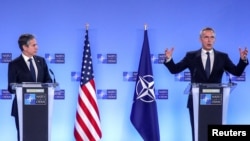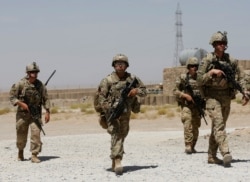The United States is still considering its options in Afghanistan, with time ticking down until a May 1 deadline to pull its remaining 2,500 troops from the country under a deal signed with the Taliban last year.
Key U.S. lawmakers have been voicing doubts in recent weeks, saying that it simply will not be possible to pull thousands of troops and millions of dollars’ worth of equipment, with just over a month remaining until the deadline.
But the Defense Department late Tuesday insisted time would not be an issue while continuing to say no decision on what to do with the troops has been made.
“When the commander-in-chief has made a decision, we’ll execute that decision, whatever it is,” Pentagon press secretary John Kirby told reporters, adding that the review of the U.S. military posture in Afghanistan, ordered by U.S. President Joe Biden, is “going on right now.”
Kirby also said Defense Secretary Lloyd Austin remains confident that “if the decision is made to completely withdraw U.S. troops from Afghanistan, that they will get it done in a safe, orderly and effective way.”
Further complicating matters, U.S. Secretary of State Antony Blinken pledged earlier Tuesday that Washington would consult with its NATO allies on the withdrawal.
“We went in together, we have adjusted together and when the time is right, we will leave together,” Blinken told reporters in Brussels, where NATO foreign ministers are meeting to discuss the way forward in Afghanistan.
Taliban spokesman Zabihullah Mujahid, while reacting to Blinken’s remarks, told VOA the insurgent group expects the U.S. to honor and fully implement the deal.
“It is clearly stated in the agreement that America will withdraw all its troops (from Afghanistan) by May 1, and we again ask them to strictly adhere to the mutually agreed deadline,” Mujahid said.
“In case Americans do not meet their obligations and abandon the agreement, the Islamic Emirate (Taliban) will be forced to defend their nation and consider all other options to force foreign troops out of the country,” Mujahid said. He did not elaborate.
Blinken in his talk Tuesday reiterated that the U.S.-Taliban deal was still being reviewed by the Biden administration and that he will “share some of our initial thinking” with NATO allies to “listen and consult” with them.
“Last week, President Biden noted that it would be tough to meet the May 1 deadline for a full withdrawal; but whatever the United States ends up doing will be informed by the thinking of our NATO allies, which I’ll take back to me after these conversations and consultations,” said Blinken.
“Tactical decisions aside, we are united with our NATO allies in seeking to bring a responsible end to this conflict and to remove our troops from harm’s way just as we are collectively determined to ensure that Afghanistan never again becomes a safe haven for terrorists who could threaten the United States or our allies,” he added.
NATO Secretary-General Jens Stoltenberg, speaking alongside Blinken, supported and welcomed the Biden administration’s renewed efforts to push the Taliban and the Afghan government into a power-sharing peace deal to ensure Afghanistan does not collapse into greater violence and chaos after the foreign troop pullout.
“The challenge now is that we have peace talks and we strongly welcome them. They are fragile but they are the only path to a lasting political solution in Afghanistan…and to achieve that, all parties need to negotiate in good faith,” Stoltenberg said.
The NATO chief stressed the need for reducing Afghan violence and urged the Taliban to “stop supporting international terrorists, including (the) al-Qaida (network).”
Key U.S. lawmakers, citing what they say is the Taliban’s failure to adhere to its part of the bargain, have voiced doubts in recent weeks that the U.S. will withdraw its troops by May 1.
"I think by inaction, they've made clear they're not going to be out of there by May 1," Representative Mike Rogers, the lead Republican on the House Armed Service Committee, told reporters Monday, adding that, logistically, there just is not enough time.
“It's not possible now for us to leave and get out of there in a safe manner," he said.
The chairman of the committee, Democrat Adam Smith, said earlier this month a U.S. withdrawal by May 1 would be “highly unlikely.”
The U.S.-Taliban pact encouraged the insurgents to open the first direct talks with representatives of the Afghan government in Doha last September to try to agree on a political deal that would end the nearly two decades of war.
But the so-called intra-Afghan peace dialogue has made little progress and remained stalled for most of the time, with both Afghan rivals accusing each other of delays.
Blinken said in a strongly-worded letter to Ghani earlier this month it is urgent that the Afghan government accelerate the peace process.
He warned that even if the U.S. financial assistance of around $4 billion continued for Kabul to help sustain Afghan security forces after the foreign troop withdrawal, the Taliban would make rapid territorial gains.
In a weekly commentary published on its official website Tuesday, the Taliban group said it has “fulfilled all its responsibilities” outlined in the agreement” signed with the U.S. in Doha, the capital of Qatar, in February 2020.
“We hope that the other parties, be they foreign or internal, also remain committed to the Doha agreement so that the process of intra-Afghan negotiations may arrive at a successful destination through following this roadmap,” said the insurgent statement.
The Taliban reject allegations they maintain ties with transnational terror groups. Taliban leaders have ignored international calls for reducing battlefield attacks in Afghanistan until they strike a power-sharing agreement with Afghan rivals that would see formation of an “Islamic government” in the country.
Afghan President Ashraf Ghani has long resisted relinquishing power in favor of a transitional government, saying he will transfer power only through elections. The Taliban reject the Ghani administration as an illegal entity and a product of the U.S. occupation of Afghanistan.





